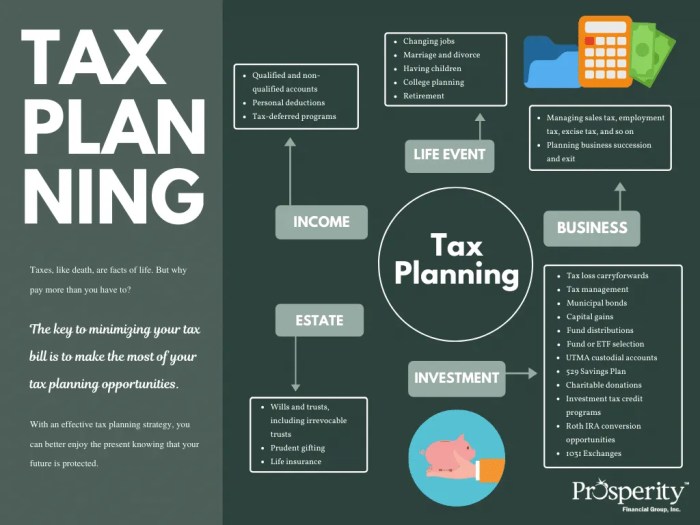Tax planning tips are like the secret weapon in your financial arsenal, helping you navigate the complex world of taxes with finesse and savvy. Think of it as your roadmap to keeping more of your hard-earned money in your pocket, all while staying ahead of the game.
As we dive into the world of tax planning tips, get ready to uncover strategies that can potentially save you thousands of dollars and set you up for a brighter financial future.
Importance of Tax Planning
Tax planning is essential for both individuals and businesses to effectively manage their finances and reduce tax liabilities. By strategically organizing financial affairs and transactions, individuals and businesses can optimize their tax situation and ensure compliance with tax laws.
Benefits of Effective Tax Planning
- Minimize Tax Liabilities: One of the primary benefits of tax planning is the ability to reduce the amount of taxes owed by taking advantage of available deductions, credits, and exemptions.
- Improve Cash Flow: Effective tax planning can help individuals and businesses manage their cash flow better by reducing tax payments and freeing up funds for other purposes.
- Ensure Compliance: By staying informed about tax laws and regulations, individuals and businesses can avoid penalties and legal issues related to non-compliance.
- Maximize Savings: Through strategic tax planning, individuals and businesses can maximize their savings by investing in tax-efficient vehicles and retirement accounts.
Examples of Tax Planning Strategies
- Utilizing Retirement Accounts: Contributing to retirement accounts such as 401(k)s and IRAs can help individuals reduce taxable income and save for the future.
- Charitable Giving: Making donations to qualified charities not only benefits the community but also allows individuals to deduct charitable contributions from their taxes.
- Timing Capital Gains: Timing the sale of investments to minimize capital gains tax liability is a common tax planning strategy used by investors.
Tax Saving Strategies
When it comes to tax-saving strategies, individuals have a variety of options to explore in order to minimize their tax liability. These strategies can range from short-term solutions to long-term investments that provide ongoing benefits. By understanding and implementing these strategies effectively, individuals can optimize their financial situation and keep more of their hard-earned money in their pockets.
Short-term vs. Long-term Strategies
- Short-term strategies often involve taking advantage of tax deductions, credits, and deferrals that can immediately reduce taxable income. This can include contributions to retirement accounts, health savings accounts, or taking advantage of education credits.
- On the other hand, long-term strategies focus on investments that provide tax benefits over an extended period of time. This can include investing in tax-advantaged accounts like Roth IRAs, 529 college savings plans, or utilizing capital gains tax strategies.
Examples of Tax-saving Investments or Deductions
- Investing in a traditional IRA or 401(k) can allow individuals to deduct contributions from their taxable income, reducing their overall tax burden.
- Utilizing the mortgage interest deduction can help homeowners reduce their taxable income by deducting the interest paid on their mortgage loan.
- Contributing to a Health Savings Account (HSA) allows individuals to save pre-tax dollars for medical expenses, providing a triple tax advantage of tax-deductible contributions, tax-deferred growth, and tax-free withdrawals for qualified medical expenses.
Year-Round Tax Planning

Year-round tax planning is crucial for individuals to optimize their tax situation and minimize tax liabilities throughout the year. By staying proactive and organized, individuals can take advantage of various tax-saving opportunities and strategies.
Consistent Monitoring and Adjustments
Effective year-round tax planning involves consistently monitoring financial activities and making adjustments as needed. This includes keeping track of income, expenses, investments, and any changes in tax laws that may impact your tax situation.
- Regularly review your financial records and tax documents to ensure accuracy.
- Stay informed about any changes in tax laws or regulations that could affect your tax planning strategies.
- Consider consulting with a tax professional periodically to discuss your tax situation and explore new opportunities for tax savings.
Organizational Tips for Year-Round Tax Planning
Staying organized is key to effective year-round tax planning. By maintaining proper records and documentation, individuals can ensure that they are prepared come tax season and can maximize their tax savings.
- Keep all financial documents, such as receipts, invoices, and statements, organized and easily accessible.
- Use accounting software or apps to track income, expenses, and deductions throughout the year.
- Create a filing system for tax-related documents, such as W-2s, 1099s, and investment statements, to avoid last-minute scrambling during tax season.
- Set reminders for important tax deadlines and milestones, such as estimated tax payments or IRA contributions.
Retirement Planning and Taxes
Retirement planning is crucial not only for securing your future but also for managing your tax liabilities effectively. As you prepare for retirement, it’s essential to consider the tax implications of your decisions to maximize savings and minimize tax burdens.
Tax Benefits of Retirement Accounts
When you contribute to retirement accounts such as 401(k)s, IRAs, or Roth IRAs, you can benefit from tax advantages. Contributions to traditional retirement accounts are often tax-deductible, reducing your taxable income for the year. Additionally, earnings on investments within these accounts grow tax-deferred, allowing your savings to compound over time without being taxed annually. In the case of Roth IRAs, withdrawals in retirement are tax-free, providing a significant advantage when managing taxes in retirement.
Tax-Efficient Withdrawal Strategies
During retirement, the way you withdraw funds from your various retirement accounts can impact your tax situation. By strategically planning your withdrawals, you can minimize tax liabilities and make the most of your savings. Consider factors such as your income needs, the tax implications of different account types, and your overall financial picture when determining the best withdrawal strategy. For example, withdrawing from taxable accounts first and letting tax-deferred accounts grow can help manage taxes effectively in retirement.